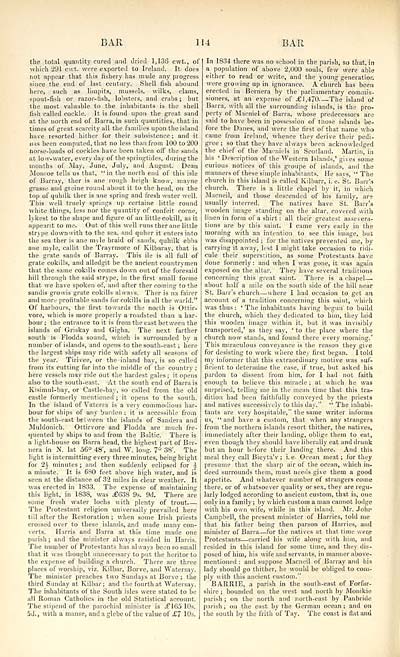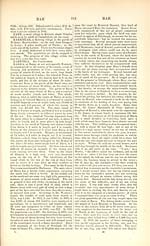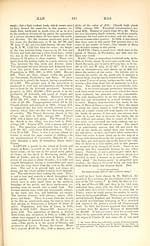Topographical, statistical, and historical gazetteer of Scotland > Volume 1
(194) Page 114 - BAR
Download files
Complete book:
Individual page:
Thumbnail gallery: Grid view | List view

BAR
114
BAR
the total quantity cured and dried 1,133 cwt., of
which 1291 cwt. were exported to Ireland. It does
not appear that this fishery has made any progress
since the end of last century. Shell fish abound
here, such as liinpits, mussels, wilks, clams,
spout-fisli or razor-fish, lobsters, and crabs ; but
the most valuable to the inhabitants is the shell
fish called cockle. It is found upon the great sand
at the north end of Barra, in such quantities, that in
times of great scarcity all the families upon the island
have resorted hither for their subsistence ; and it
nas been computed, that no less than from 100 to "200
norse-loads of cockles have been taken off the sands
at low-water, every day of the springtides, during the
months of May, June, July, and August. Dean
Monroe tells us that, "in the north end of this isle
of Barray, ther is ane rough heigh know, inayne
grasse and greine round about it to the head, on the
top of quhilk ther is ane spring and fresh water well.
This well truely springs up certaine little round
white things, less nor the quantity of confeit come,
lykest to the shape and figure of an little cokill, as it
appearit to me. Out of this well runs ther ane little
strype downwith to the sea, and quher it enters into
the sea ther is ane myle braid of sands, quhilk ebbs
ane myle, eallit the Trayrmore of Kilbaray, that is
the grate sands of Barray. This ile is all full of
grate cokills, and alledgit be the ancient countrymen
that the same cokills comes down out of the foresaid
hill through the said strype, in the first small forme
that we have spoken of, and after ther coming to the
sandis growis grate cokills always. Ther is na fairer
and more profitable sands for cokills in all the warld."
Of harbours, the first towards the north is Ottir-
vore, which is more properly a roadsted than a har-
bour ; the entrance to it is from the east between the
islands of Griskay and Gigha. The next farther
south is Flodda sound, which is surrounded by a
number of islands, and opens to the south-east ; here
the largest ships may ride with safety all seasons of
the year. Tirivee, or the inland bay, is so called
from its cutting far into the middle of the country ;
here vessels may ride out the hardest gales; it opens
also to the south-east. At the south end of Barra is
Kisimul-bay, or Castle-bay, so called from the old
castle formerly mentioned ; it opens to the south.
In the island of Vatersa is a very commodious har-
bour for ships of any burden : it is accessible from
the south-east between the islands of Sandera and
Muldonich. Ottirvore and Flodda are much fre-
quented by ships to and from the Baltic. There is
a light-house on Barra head, the highest part of Ber-
nera in N. lat 56° 48', and W. long. 7° 38'. The
light is intermitting every three minutes, being bright
for 2^ minutes ; and then suddenly eclipsed for i
a minute. It is 680 feet above high water, and is
seen at the distance of 32 miles in clear weather. It
was erected in 1833. The expense of maintaining
this light, in 1838, was £638 9s. 9d. There are
some fresh water lochs with plenty of trout
The Protestant religion universally prevailed here
till after the Restoration ; when some Irish priests
crossed over to these islands, and made many con-
verts. Harris and Barra at this time made one
parish; and the minister always resided in Harris.
The number of Protestants has always been so small
that it was thought unnecessary to put the heritor to
the expense of building a church. There are three
places of worship, viz. Kilbar, Borve, and Watersay.
The minister preaches two Sundays at Borve ; the
third Sunday at Kilbar; and the fourth at Watersay.
The inhabitants of the South isles were stated to be
all Roman Catholics in the old Statistical account.
The stipend of the parochial minister is £165 10s.
5d., with a manse, and a glebe of the value of £7 10s.
In 1834 there was no school in the parish, so that, in
a population of above 2,000 souls, few were able
either to read or write, and the young generation
were growing up in ignorance. A church has been
erected in Bernera by the parliamentary commis-
sioners, at an expense of ±'1,470 — :The island ot
Barra, with all the surrounding islands, is the pro-
perty of Macniel of Barra, whose predecessors are
said to have been in possession of those islands be-
fore the Danes, and were the first of that name who
came from Ireland, whence they derive their pedi.
gree ; so that they have always been acknowledged
the chief of the Macnicls in Scotland. Martin, in
his 'Description of the Western Islands,' gives some
curious notices of this groupe of islands, and the
manners of these simple inhabitants. He savs, " The
church in this island is called Kilbarr, i. e. St. Barr's
church. There is a little chapel by it, in which
Macneil, and those descended of his family, are
usually interred. The natives have St. Barr's
wooden image standing on the altar, covered with
linen in form of a shirt : all their greatest assevera-
tions are by this saint. I came very early in the
morning with an intention to see this image, but
was disappointed ; for the natives prevented me, by
carrying it away, lest I might take occasion to ridi-
cule their superstition, as some Protestants have
done formerly : and when I was gone, it was again
exposed on the altar. They have several traditions
concerning this great saint. There is a chapel — .
about half a mile on the south side of the hill near
St. Barr's church — where I had occasion to get an
account of a tradition concerning this saint, which
was thus: ' The inhabitants having begun' to build
the church, which they dedicated to him, they laid
this wooden image within it, but it was invisibly
transported,' as they say, ' to the place where the
church now stands, and found there every morning.'
This miraculous conveyance is the reason they give
for desisting to work where they first began. I told
my informer that this extraordinary motive was suf-
ficient to determine the case, if true, but asked his
pardon to dissent from him, for I had not faith
enough to believe this miracle; at which he was
surprised, telling me in the mean time that this tra-
dition had been faithfully conveyed by the priests
and natives successively to this day." " The inhabi-
tants are very hospitable," the same writer informs
us, " and have a custom, that when any strangers
from the northern islands resort thither, the natives,
immediately after their landing, oblige them to eat,
even though they should have liberally eat and drunk
but an hour before their landing there. And this
meal they call Bieyta'v; i.e. Ocean meat; for they
presume that the sharp air of the ocean, which in-
deed surrounds them, must needs give them a good
appetite. And whatever number of strangers come
there, or of whatsoever quality or sex, they are regu-
larly lodged according to ancient custom, that is, one
only in a family; by which custom a man cannot lodge
with his own wife, while in this island. Mr. Johu
Campbell, the present minister of Harries, told me
that his father being then parson of Harries, and
minister of Barra — for the natives at that time wer.e
Protestants — carried his wife along with him, and
resided in this island for some time, and they dis-
posed of him, his wife and servants, in manner above-
mentioned : and suppose Macneil of Barray and his
lady should go thither, he would be obliged to com-
ply with this ancient custom."
BARRIE, a parish in the south-east of Forfar-
shire ; bounded on the west and north by Monikie
parish ; on the north and north-east by Panbride
parish; on the east by the German ocean; and on
the south by the frith of Tay. The coast is flat and
114
BAR
the total quantity cured and dried 1,133 cwt., of
which 1291 cwt. were exported to Ireland. It does
not appear that this fishery has made any progress
since the end of last century. Shell fish abound
here, such as liinpits, mussels, wilks, clams,
spout-fisli or razor-fish, lobsters, and crabs ; but
the most valuable to the inhabitants is the shell
fish called cockle. It is found upon the great sand
at the north end of Barra, in such quantities, that in
times of great scarcity all the families upon the island
have resorted hither for their subsistence ; and it
nas been computed, that no less than from 100 to "200
norse-loads of cockles have been taken off the sands
at low-water, every day of the springtides, during the
months of May, June, July, and August. Dean
Monroe tells us that, "in the north end of this isle
of Barray, ther is ane rough heigh know, inayne
grasse and greine round about it to the head, on the
top of quhilk ther is ane spring and fresh water well.
This well truely springs up certaine little round
white things, less nor the quantity of confeit come,
lykest to the shape and figure of an little cokill, as it
appearit to me. Out of this well runs ther ane little
strype downwith to the sea, and quher it enters into
the sea ther is ane myle braid of sands, quhilk ebbs
ane myle, eallit the Trayrmore of Kilbaray, that is
the grate sands of Barray. This ile is all full of
grate cokills, and alledgit be the ancient countrymen
that the same cokills comes down out of the foresaid
hill through the said strype, in the first small forme
that we have spoken of, and after ther coming to the
sandis growis grate cokills always. Ther is na fairer
and more profitable sands for cokills in all the warld."
Of harbours, the first towards the north is Ottir-
vore, which is more properly a roadsted than a har-
bour ; the entrance to it is from the east between the
islands of Griskay and Gigha. The next farther
south is Flodda sound, which is surrounded by a
number of islands, and opens to the south-east ; here
the largest ships may ride with safety all seasons of
the year. Tirivee, or the inland bay, is so called
from its cutting far into the middle of the country ;
here vessels may ride out the hardest gales; it opens
also to the south-east. At the south end of Barra is
Kisimul-bay, or Castle-bay, so called from the old
castle formerly mentioned ; it opens to the south.
In the island of Vatersa is a very commodious har-
bour for ships of any burden : it is accessible from
the south-east between the islands of Sandera and
Muldonich. Ottirvore and Flodda are much fre-
quented by ships to and from the Baltic. There is
a light-house on Barra head, the highest part of Ber-
nera in N. lat 56° 48', and W. long. 7° 38'. The
light is intermitting every three minutes, being bright
for 2^ minutes ; and then suddenly eclipsed for i
a minute. It is 680 feet above high water, and is
seen at the distance of 32 miles in clear weather. It
was erected in 1833. The expense of maintaining
this light, in 1838, was £638 9s. 9d. There are
some fresh water lochs with plenty of trout
The Protestant religion universally prevailed here
till after the Restoration ; when some Irish priests
crossed over to these islands, and made many con-
verts. Harris and Barra at this time made one
parish; and the minister always resided in Harris.
The number of Protestants has always been so small
that it was thought unnecessary to put the heritor to
the expense of building a church. There are three
places of worship, viz. Kilbar, Borve, and Watersay.
The minister preaches two Sundays at Borve ; the
third Sunday at Kilbar; and the fourth at Watersay.
The inhabitants of the South isles were stated to be
all Roman Catholics in the old Statistical account.
The stipend of the parochial minister is £165 10s.
5d., with a manse, and a glebe of the value of £7 10s.
In 1834 there was no school in the parish, so that, in
a population of above 2,000 souls, few were able
either to read or write, and the young generation
were growing up in ignorance. A church has been
erected in Bernera by the parliamentary commis-
sioners, at an expense of ±'1,470 — :The island ot
Barra, with all the surrounding islands, is the pro-
perty of Macniel of Barra, whose predecessors are
said to have been in possession of those islands be-
fore the Danes, and were the first of that name who
came from Ireland, whence they derive their pedi.
gree ; so that they have always been acknowledged
the chief of the Macnicls in Scotland. Martin, in
his 'Description of the Western Islands,' gives some
curious notices of this groupe of islands, and the
manners of these simple inhabitants. He savs, " The
church in this island is called Kilbarr, i. e. St. Barr's
church. There is a little chapel by it, in which
Macneil, and those descended of his family, are
usually interred. The natives have St. Barr's
wooden image standing on the altar, covered with
linen in form of a shirt : all their greatest assevera-
tions are by this saint. I came very early in the
morning with an intention to see this image, but
was disappointed ; for the natives prevented me, by
carrying it away, lest I might take occasion to ridi-
cule their superstition, as some Protestants have
done formerly : and when I was gone, it was again
exposed on the altar. They have several traditions
concerning this great saint. There is a chapel — .
about half a mile on the south side of the hill near
St. Barr's church — where I had occasion to get an
account of a tradition concerning this saint, which
was thus: ' The inhabitants having begun' to build
the church, which they dedicated to him, they laid
this wooden image within it, but it was invisibly
transported,' as they say, ' to the place where the
church now stands, and found there every morning.'
This miraculous conveyance is the reason they give
for desisting to work where they first began. I told
my informer that this extraordinary motive was suf-
ficient to determine the case, if true, but asked his
pardon to dissent from him, for I had not faith
enough to believe this miracle; at which he was
surprised, telling me in the mean time that this tra-
dition had been faithfully conveyed by the priests
and natives successively to this day." " The inhabi-
tants are very hospitable," the same writer informs
us, " and have a custom, that when any strangers
from the northern islands resort thither, the natives,
immediately after their landing, oblige them to eat,
even though they should have liberally eat and drunk
but an hour before their landing there. And this
meal they call Bieyta'v; i.e. Ocean meat; for they
presume that the sharp air of the ocean, which in-
deed surrounds them, must needs give them a good
appetite. And whatever number of strangers come
there, or of whatsoever quality or sex, they are regu-
larly lodged according to ancient custom, that is, one
only in a family; by which custom a man cannot lodge
with his own wife, while in this island. Mr. Johu
Campbell, the present minister of Harries, told me
that his father being then parson of Harries, and
minister of Barra — for the natives at that time wer.e
Protestants — carried his wife along with him, and
resided in this island for some time, and they dis-
posed of him, his wife and servants, in manner above-
mentioned : and suppose Macneil of Barray and his
lady should go thither, he would be obliged to com-
ply with this ancient custom."
BARRIE, a parish in the south-east of Forfar-
shire ; bounded on the west and north by Monikie
parish ; on the north and north-east by Panbride
parish; on the east by the German ocean; and on
the south by the frith of Tay. The coast is flat and
Set display mode to: Large image | Transcription
Images and transcriptions on this page, including medium image downloads, may be used under the Creative Commons Attribution 4.0 International Licence unless otherwise stated. ![]()
| Gazetteers of Scotland, 1803-1901 > Topographical, statistical, and historical gazetteer of Scotland > Volume 1 > (194) Page 114 - BAR |
|---|
| Permanent URL | https://digital.nls.uk/97439874 |
|---|
| Description | Volume first. A-H. |
|---|---|
| Attribution and copyright: |
|

